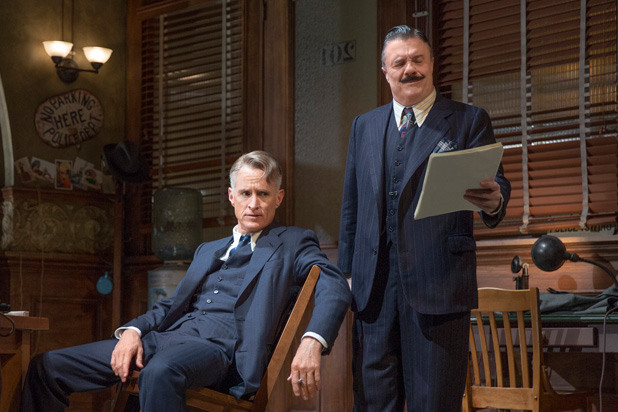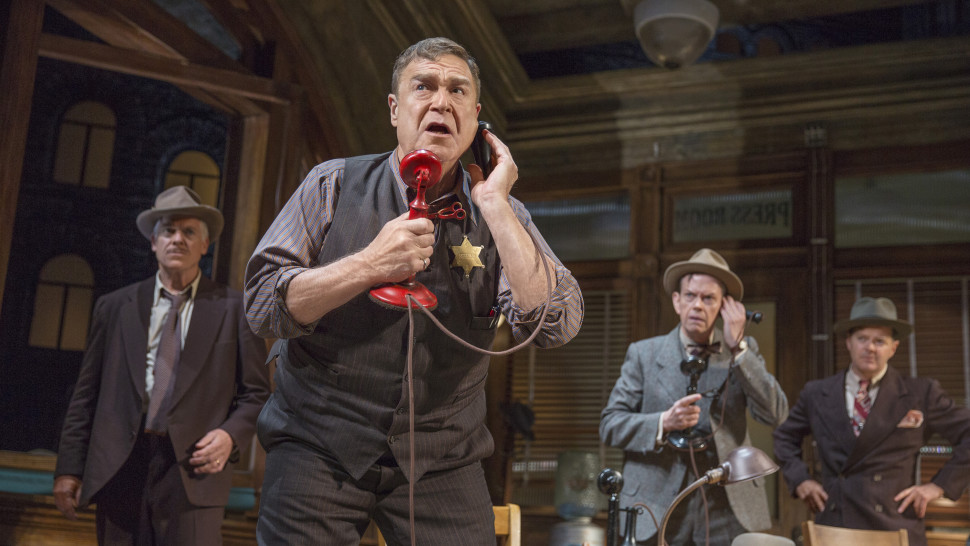 As anyone who’s been following the news knows, the fourth estate has taken quite a beating lately: fake news, accusations of bias, trial by Twitter and the arrival of ‘alternative facts’. Seen in this climate, the magnificent Broadway revival of The Front Page, now in its last week at the Broadhurst Theatre, is more than just a good night out: it’s a spiritual necessity.
As anyone who’s been following the news knows, the fourth estate has taken quite a beating lately: fake news, accusations of bias, trial by Twitter and the arrival of ‘alternative facts’. Seen in this climate, the magnificent Broadway revival of The Front Page, now in its last week at the Broadhurst Theatre, is more than just a good night out: it’s a spiritual necessity.
The plot: It’s Chicago, 1928 and Hildebrand ‘Hildy’ Johnson (John Slattery), star reporter at the Examiner, is quitting his job and leaving town to settle down with a nice girl and a respectable career. He drops by the press room at the Cook County Criminal Court building to say his farewells and finds his colleagues waiting for the hanging of Earl Williams (John Magaro), a white man and alleged Communist convicted of shooting a black policeman. Suddenly, Williams escapes. Can Hildy resist staying to cover the biggest story in town? Not if the Examiner’s scheming editor Walter Burns (Nathan Lane) has anything to do with it.
American journalism never received a more caustic love letter than The Front Page, best known to film buffs as the inspiration for His Girl Friday. Playwrights Ben Hecht and Charles MacArthur, veterans of the Chicago Tribune and Chicago Daily News respectively, lacerate the profession as only former newsmen can, cramming the stage with unrepentant hacks desperate for their next scoop and the unfortunate civilians who are their prey. No one is exempt from ridicule. Yet Hecht and MacArthur’s cynicism goes hand in hand with an obvious affection for reporters and their most sacred of duties: keeping the public informed.
 And in a semi-lawless Chicago, there’s a lot of muck to rake. Earl Williams is slated to hang just two days before Election Day, so Sheriff Hartman (John Goodman) and the Mayor (Dann Florek) can use his execution as a smokescreen, distracting attention from the police department’s habitual abuse of black people. Goodman goes broad and gets laughs as the sheriff, a bumptious, dim-witted gorilla of a man who stirs up anti-Communist panic for publicity and looks piqued when the Mayor complains about the 400-strong posse of deputies he creates to hunt down Williams. (Hartman’s election slogan is “Reform the Reds with a rope,” a reminder that the Red Scare was alive and well in the twenties.) Further inconvenience arrives in the form of Mr. Pincus (the inimitable Robert Morse), bearing a reprieve that could save Williams from the gallows. Poor Mr. Pincus is a simple, honest soul who is content with his lot and speaks as plainly as a child; Morse transforms his imperviousness to bribery into a comic tour de force.
And in a semi-lawless Chicago, there’s a lot of muck to rake. Earl Williams is slated to hang just two days before Election Day, so Sheriff Hartman (John Goodman) and the Mayor (Dann Florek) can use his execution as a smokescreen, distracting attention from the police department’s habitual abuse of black people. Goodman goes broad and gets laughs as the sheriff, a bumptious, dim-witted gorilla of a man who stirs up anti-Communist panic for publicity and looks piqued when the Mayor complains about the 400-strong posse of deputies he creates to hunt down Williams. (Hartman’s election slogan is “Reform the Reds with a rope,” a reminder that the Red Scare was alive and well in the twenties.) Further inconvenience arrives in the form of Mr. Pincus (the inimitable Robert Morse), bearing a reprieve that could save Williams from the gallows. Poor Mr. Pincus is a simple, honest soul who is content with his lot and speaks as plainly as a child; Morse transforms his imperviousness to bribery into a comic tour de force.
The press aren’t averse to shenanigans either. Dashing off wisecracks at warp speed, John Slattery invests Hildy with a roguish charm that’s impossible to dislike, even as he dupes his colleagues and perverts the course of justice. It’s doubtful that Johnson’s line about moving to New York to become an ad man has ever gotten a bigger laugh than when Slattery (a.k.a. Mad Men’s Roger Sterling) says it. Hildy swans into the press room tipsy from a night on the town, but we quickly realise he’s long been addicted to something even more intoxicating: the glory of newsprint. When Williams breaks loose and the other reporters stampede out, Slattery stares at the Examiner phone for an age before finally succumbing to temptation and calling Burns. It’s a moment of exquisite clarity which informs every decision Hildy makes from then on.
If Johnson is the press corps’ chief rogue, then Walter Burns is its Lord of Misrule. It’s no coincidence that the Examiner’s phone is bright red: Burns is devilishly good at getting what he wants. Nathan Lane sinks his teeth into the role, transforming himself into a maniacal lunatic, capable of threatening, cajoling and lying to anyone who crosses his path. The joys of his performance are not merely verbal, but physical. In one beautifully paced gag, Burns attempts to smuggle a roll-top desk out of the building, but finds it impossible to move. Lane slowly slides down the desk until he’s pushing against it at a 45 degree angle—a moment of high slapstick amidst the verbal chaos.
Hecht and MacArthur’s rapid-fire script builds into a surprisingly dense plot. Miraculously, director Jack O’ Brien keeps all the plates spinning, marshalling an excellent cast of character actors, including Jefferson Mays, Dylan Baker, Holland Taylor and the affecting Sherie Rene Scott as Mollie Malloy, the woman who pricks what little remains of the reporters’ consciences.
The Front Page has been popular with Hollywood almost since the dawn of sound and has been adapted for the screen four times. (In one of cinema’s greatest crimes, Lee Tracy, the original Hildy on Broadway, wasn’t cast when the play was first turned into a film in 1931. Go watch him as the manipulative, motor-mouthed reporter in Blessed Event and dream of what might have been.) Despite occasional visits by Mollie and a handful of other women, the press room is very much a boys’ club, a stark contrast with His Girl Friday, which famously gender flips Hildy into Hildegard Johnson, now Burn’s ex-wife as well as best journalist. On stage, Hildy and Burns are soul mates of a different sort, bound together by a mutual obsession with fresh copy—but their relationship is no less satisfying.
For all their scheming, Hildy, Burns and their fellow reporters bleed newsprint and in their deepest hearts, perceive journalism not just as a job, but as a calling. It’s this commitment, an implicit tribute to the scrappy spirit of reporting, that ensures The Front Page a place in the hearts of ink-stained wretches everywhere. Power to the press.
Leave a Reply